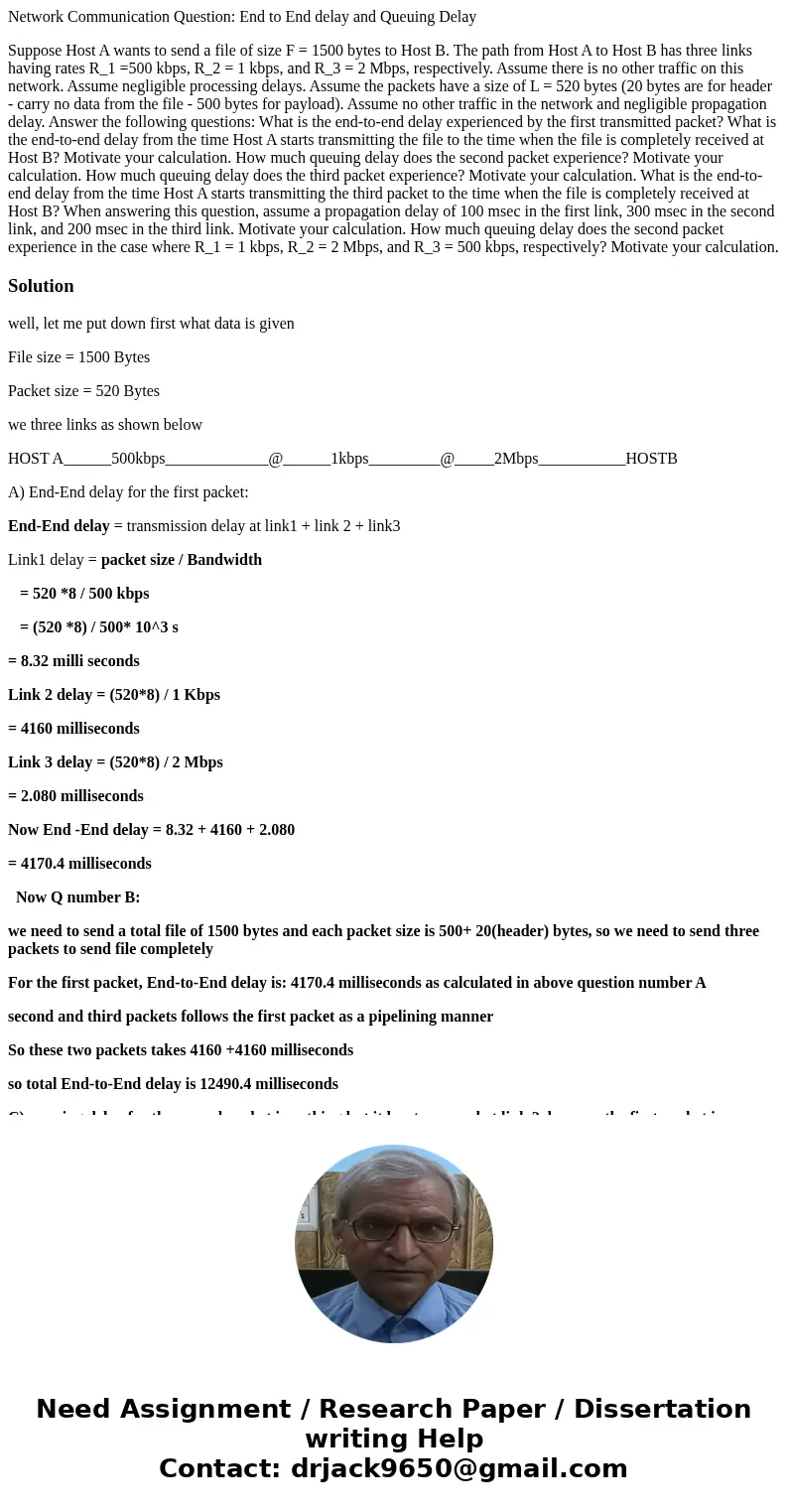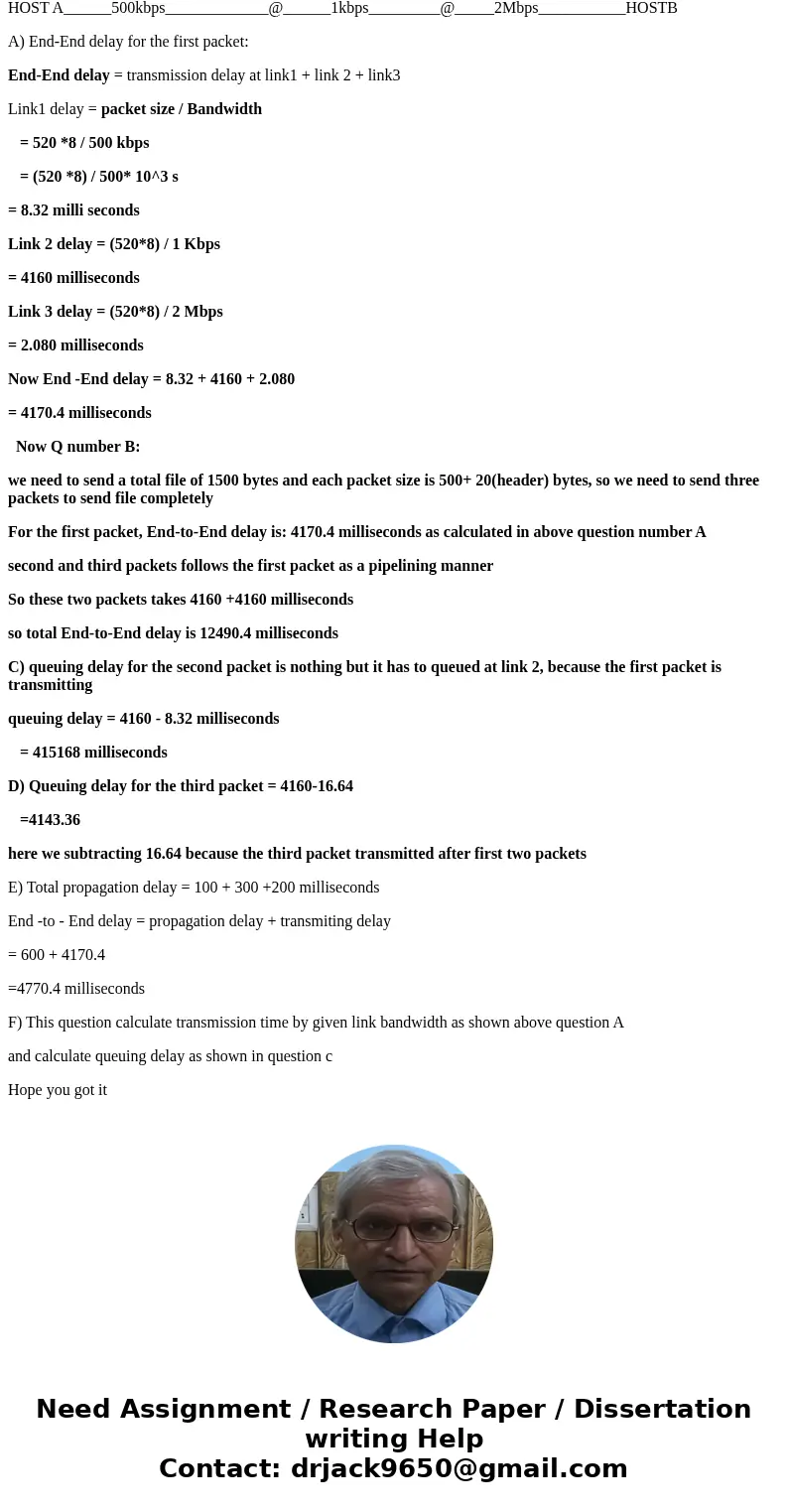Network Communication Question End to End delay and Queuing
Network Communication Question: End to End delay and Queuing Delay
Suppose Host A wants to send a file of size F = 1500 bytes to Host B. The path from Host A to Host B has three links having rates R_1 =500 kbps, R_2 = 1 kbps, and R_3 = 2 Mbps, respectively. Assume there is no other traffic on this network. Assume negligible processing delays. Assume the packets have a size of L = 520 bytes (20 bytes are for header - carry no data from the file - 500 bytes for payload). Assume no other traffic in the network and negligible propagation delay. Answer the following questions: What is the end-to-end delay experienced by the first transmitted packet? What is the end-to-end delay from the time Host A starts transmitting the file to the time when the file is completely received at Host B? Motivate your calculation. How much queuing delay does the second packet experience? Motivate your calculation. How much queuing delay does the third packet experience? Motivate your calculation. What is the end-to-end delay from the time Host A starts transmitting the third packet to the time when the file is completely received at Host B? When answering this question, assume a propagation delay of 100 msec in the first link, 300 msec in the second link, and 200 msec in the third link. Motivate your calculation. How much queuing delay does the second packet experience in the case where R_1 = 1 kbps, R_2 = 2 Mbps, and R_3 = 500 kbps, respectively? Motivate your calculation.Solution
well, let me put down first what data is given
File size = 1500 Bytes
Packet size = 520 Bytes
we three links as shown below
HOST A______500kbps_____________@______1kbps_________@_____2Mbps___________HOSTB
A) End-End delay for the first packet:
End-End delay = transmission delay at link1 + link 2 + link3
Link1 delay = packet size / Bandwidth
= 520 *8 / 500 kbps
= (520 *8) / 500* 10^3 s
= 8.32 milli seconds
Link 2 delay = (520*8) / 1 Kbps
= 4160 milliseconds
Link 3 delay = (520*8) / 2 Mbps
= 2.080 milliseconds
Now End -End delay = 8.32 + 4160 + 2.080
= 4170.4 milliseconds
Now Q number B:
we need to send a total file of 1500 bytes and each packet size is 500+ 20(header) bytes, so we need to send three packets to send file completely
For the first packet, End-to-End delay is: 4170.4 milliseconds as calculated in above question number A
second and third packets follows the first packet as a pipelining manner
So these two packets takes 4160 +4160 milliseconds
so total End-to-End delay is 12490.4 milliseconds
C) queuing delay for the second packet is nothing but it has to queued at link 2, because the first packet is transmitting
queuing delay = 4160 - 8.32 milliseconds
= 415168 milliseconds
D) Queuing delay for the third packet = 4160-16.64
=4143.36
here we subtracting 16.64 because the third packet transmitted after first two packets
E) Total propagation delay = 100 + 300 +200 milliseconds
End -to - End delay = propagation delay + transmiting delay
= 600 + 4170.4
=4770.4 milliseconds
F) This question calculate transmission time by given link bandwidth as shown above question A
and calculate queuing delay as shown in question c
Hope you got it


 Homework Sourse
Homework Sourse